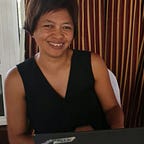How school meals feed smiles and hope in southern Madagascar
World Food Programme (WFP) provides meals to 300,000 children in drought-stricken region
On a sunny day, 11-year-old Séverine and her classmates are having good time at the school refectory in the village of Tsongobory, southern Madagascar.
In this part of the island, drought means people are not sure where their next meal will come from, and children suffer the most. During lean seasons, school absenteeism reaches its highest level. Children often have to work and help their parents look for food, or stay at home as they lack the energy to walk the long distances — up to 10 kilometres — between the village and the school.
The damage caused by pests and irregular rainfall during the 2018 and 2019 cropping seasons seriously compromised rice and maize harvests. As a result, 900,000 people from nine districts of southern Madagascar are acutely food insecure and in need of immediate humanitarian assistance.
Séverine lives with her parents and two brothers. Like most vulnerable families in the south of the island, her parents struggle to feed their children. Luckily, Severine attends Tsongobory primary school, where she receives daily meals from the UN World Food Programme (WFP).
Only 43 percent of primary schools in the region are covered by this much- needed programme. Thanks to support from the Government of Madagascar, Norway, Russia and Mastercard, 300,000 children from 1,000 primary schools receive daily hot meals consisting of cereals, pulses and oil fortified with vitamins and minerals.
School meals mean a lot to children and their families
“Food is not an abundant resource. During the kere — hunger — time, families often rely on one meal a day. The food that children are getting at school means a lot to them and their families,” says Astella Christine, a cook at Tsongobory school.
In the village of Tsongobory, women work in small jobs such as selling candies and peanuts or washing clothes for other families and earn about US$ 0.54 per day. Men are often fishers or butchers. Their combined incomes can hardly sustain their families’ daily food needs.
School meals encourage the parents to send their children to school and contribute in improving the rates of enrollment and attendance in primary education.
”Children come in early to be sure they do not miss lunch time.”
A “Cost-Benefit Analysis” carried out in 2019 by Mastercard and WFP revealed that in south Madagascar attendance rates in school that benefit from school meals reaches 94 percent, compared with 84 percent in schools that do not.
“For some of the children, the one they have at school is the main meal of the day. By sending them to school, parents know their children will at least get lunch,” Astella Christine continues. “Children who have class in the afternoon normally eat at noon, but some of them come early to be sure not to miss lunch time.”
Partnerships improve the school meals programme
Thanks to a partnership with the Regional Direction of Agriculture, Livestock and Fishery, the UN Food and Agriculture Organization (FAO) and the International Fund for Agricultural Development (IFAD), the school meals menu is now more varied.
In the Ambovombe district, the three UN agencies and their partners implement school gardens in 20 pilot schools where land plots are available for farming. Farmers associations grow fruit and vegetables and run small scale livestock activities, which enables them to supply the school canteens with fresh foods, in addition to the in-kind assistance delivered by WFP.
“We sell part of our production to the schools and donate the rest as our contribution in developing the programme,” says Tombo, a farmer.
“School garden reflects the good collaboration between partners which has a positive impact on the children’ s health and ability to concentrate in class and learn,” adds Emma Razanamparany, the director of Beabo school in Ambovombe.
In the school gardens project, FAO provides the farmers associations with seeds, micro-irrigation kits and technical training, while IFAD supports them on administrative issues such as setting up associations or managing the project.
Innovation that changes lives
In 12 schools of the Ampanihy and Tuléar districts,WFP is introducing cash transfers which will allow schools to buy increasingly diverse foods.
In partnership with mobile phone company Airtel, cash is transferred to local selected traders and to the school canteen management committees. Providing cash to the communities gives them the flexibility to buy different foods such as fish, green leaves, vegetables, meat and fruit. At the same time, this contributes to boosting the local economy.
“I enjoy meeting my classmates, learning and having lunch at school,” Séverine concludes. Her favorite subject is French, and she wants to be a doctor when she grows up.
“It’s important that children go to school, get nutritious food and finish their studies,” said Norwegian Deputy Minister for International Development, Mr. Aksel Jakobsen, on a recent visit to Sakabera and Tsongobory schools.
